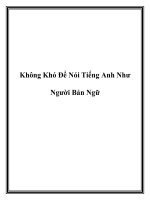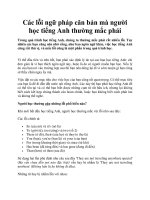Ngữ pháp tiếng anh 5
Bạn đang xem bản rút gọn của tài liệu. Xem và tải ngay bản đầy đủ của tài liệu tại đây (119.46 KB, 5 trang )
11. Inversion : Cấu trúc đảo ngữ.
Khi các trạng từ mang nghĩa phủ định ( Seldom , Rarely , Never , No sooner ,
Hardly , Not until , No longer … ) được đặt ở đầu câu. Phải đảo ngữ trợ
từ.
Examples: : 1. I seldom come there at night.
Seldom do I come
there at night .
2. People didn’t discover Aids until 1981. Not until 1981 did
people discover Aids.
It was not until
1981 that people discovered Aids.
3. We have never seen such a wonderful sight before.
Never have we seen such a wonderful sight before.
4. She had not gone to bed until her father got home from work.
Not until her father got home from work had she gone to bed.
12. Active and passive voice : Câu chủ động Câu bị động
Tenses
Active
Passive
1. Simple present
S1 + V1(s/es) + O
S2 + am / is / are + V1(pp)
2. Simple past
S1 + V1(cột 2 / ed) + O
S2 + was / were + V1(pp)
3. Present
S1 + AM / IS / ARE + V1-ing
S2+Am/Is/Are + Being
continuous
S1 + WAS / WERE + V1-ing
+V1(pp)
4. Past continuous
S2+Was/Were + Being
+V1(pp)
5. Present / past
S1 + HAS / HAVE + V1(pp)
S2+ Has / Have + Been+
perfect
HAD
V1(pp)
Had
6. Modal verbs
S1 + MODAL + V (bare inf)
S2 + MODAL + Be +V1 (pp)
Modals : can,could,will,would,shall,should,may,might,must,used to,have
to,has to,had to…
* Chủ ngữ trong câu chủ động
là :I,we,you,he,she,it,they,people,someone,somebody…
Khi đổi sang câu bị động là: by
me,us,you,him,her,it,them,people,somebody….thì bỏ đi.
* Chủ ngữ câu chủ động là nobody , no one , nothing … khi đổi sang câu bị
động thì chuyển động từ (be) chia theo “S” mới và thì ở phủ định …rồi
chuyển V1 thành V+ ed / pp.
* Nếu trong câu chủ động có 2 tân ngữ, một trong 2 tân ngữ có thể làm chủ
ngữ trong câu bị động.
* By + O đứng trước trạng ngữ chỉ thời gian và đứng sau trạng ngữ chỉ nơi
chốn trong câu bị động .
* Nếu tân ngữ trong câu bị động chỉ sự vật , sự việc thì dùng giới từ “with”
thay cho “by” trước tân ngữ đó .
* Nếu tân ngữ câu chủ động là anybody , anyone , anything … khi đổi
sang câu bị động phải chuyển thành S => nobody , no one , nothing … và
chuyển động từ sang thể ngược lại.
*** Câu bị động đặc biệt :
1. Câu bị động với think/believe/say…:
CĐ: S1 (People,They,…..)+ V1 (say/think/believe…) that + clause (S2 +
V 2(chia) + …. )
BĐ: S2+ is/am/are+ said/thought/believed…+to V2…………
To have + PII (nếu V2 lùi
1 thì so với V 1)
It+ is/am/are+ said/thought/believed… that+ clause
To be ở câu bị động được chia theo thì của V1 trong câu chủ động
Ex: People believe that 13 is an unlucky number.
=>13 is believed to be an unlucky number. =>It is believed that 13 is
an unlucky number.
They thought that Mai had gone away.
=>Mai was thought to
have gone away.
=>It was thought that Mai had gone away.
2. Câu bị động với “have”:
CĐ: S+ have/has/had sb do st BĐ: S+have/has/had st done
(by sb)
Ex: I had him repair my bicycle yesterday. =>I had my bicycle
repaired yesterday.
3. Câu bị động với “get”:
CĐ: S+ get/gets/got sb to do st BĐ: S+ get/gets/got st done
(by sb) ...
Ex: I got him to repair my car last week.
=> I got my car repaired
last week.
4. Câu bị động với “make”:
CĐ: S+ make/made sb do st …… BĐ: (sb)+ is / are / was / were
made to do st
Ex: The step mother made Littele Pea do the chores all day.
=> Littele Pea was made to do the chores all day.
5. Need:
CĐ: S + need (chia) to do st
BĐ: (st) + need (chia) to be
done (st) + (need) doing.
Ex: You need to cut your hair.
=>Your hair needs to be cut. =>
Your hair needs cutting.
Examples: 1. People speak Enghish all over the world.
Enghish is
spoken all over the world.
2. Is she making a new dress for her mother?
Is a new dress
being made for her mother?
3. The boys broke the window and took away some pictures.
The window was broken and somes pictures were taken away
by the boys .
4. You must clean the wall before you paint it. The wall must
be cleaned before it is painted .
5. He can’t see anything. Nothing can be seen ( by him ) .
6. John gave me a present.
I was given a present by
John .
A present was given for
me by John.
7. Alice saw Ann last week.
Ann was seen by Alice last
week.
8. Mr Smith found the boy in the park. The boy was found in
the park by Mr Smith.
9. Smoke filled the room
The room was
filled with smoke .
10. I had him repair my bicycle yesterday. I had my bicycle
repaired ( by him ) yesterday.
11. I get her to make some coffee.
I get some
coffee made ( by her )
13. Relative clauses : Mệnh đề quan hệ
*** Who: used for people (Subject)
Who + Verb
*** Whom: used for people (Object / him, her, them, you, us, me…)
whom + S + Verb / Clause.
*** Whose: used to show possession (his, her, their, your, our, my…)
whose + Noun
*** Which: used for things (Subject / Object) which + (S) + Verb /
Clause.
*** Where: used to modify a place
At / In / On + which /
there / here.
*** When: used to modify a noun of time
At / In / On + which / then
*** Why: used to introduce a reason
the reason, for the reason
Notes :1. Nếu có các cụm từ : Neither of them ,All of them ,Some of them ,
Any of them …
Neither of / All of / Some of / Any of … + which / whom
2. Chỉ sử dụng whom or which sau các giới từ.
3. Không được dùng that trong mệnh đề quan hệ không giới hạn.(có
dấu phẩy)
4. Phải dùng that trong mệnh đề quan hệ có tiền danh từ là một hỗn
hợp cả người và vật.
Examples: 1. I don’t know the reason . She left school fot it.
I don’t know the reason ( for which ) ……………………. she
left school .
2. This is the house . We often stay in this house in the summer.
This is the house ( in which) ……………………. we often stay
in the summer .
3. Can you arrange the time ? We can have another discussion at
that time.
Can you arrange the time ( at which ) …………………. we can
have another discussion ?
4. The man is my father . I respect his opinion best.
The man ……………………. opinion I respect most is my
father .
5. The taxi driver is friendly . He took me to yhe airport.
The taxi driver ……………………. took me to the airport is
friendly .
6. Mary and Margaret are twins . You met them yesterday.
Mary and Margaret , ……………………. you met yesterday ,
are twins .
7. I look at the moon . It was very bright that evening.
I look at the moon ……………………. was very bright that
evening .
8. That is the man to ……………………. I spoke this morning.









